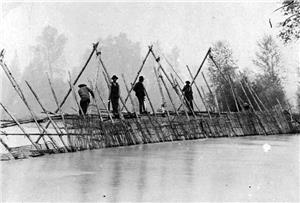In 1905, the U.S. Supreme court hands down the first decision addressing Native American fishing rights in U.S. v. Winans (198 U.S. 371). The court holds that the treaties "documented certain rights the Indians were granting to non-Indians, as well as certain other rights the Indians chose to reserve for themselves." In this case, the Yakima Tribe had licensed to a non-Native company a fish wheel at a traditional fishing site.
This decision did not prevent state authorities from limiting treaty rights. In 1916, the Washington State Supreme Court ignored the Winans case and ruled against treaty fishing rights, subjecting tribal members off reservation to state fishing regulations.
Sources:
Cesare Marino, "History of Western Washington Since 1846," Handbook of North American Indians, Vol. 7, Northwest Coast (Washington, D.C.: Smithsonian Institution, 1990), 175.
Licensing: This essay is licensed under a Creative Commons license that
encourages reproduction with attribution. Credit should be given to both
HistoryLink.org and to the author, and sources must be included with any
reproduction. Click the icon for more info. Please note that this
Creative Commons license applies to text only, and not to images. For
more information regarding individual photos or images, please contact
the source noted in the image credit.

Major Support for HistoryLink.org Provided
By:
The State of Washington | Patsy Bullitt Collins
| Paul G. Allen Family Foundation | Museum Of History & Industry
| 4Culture (King County Lodging Tax Revenue) | City of Seattle
| City of Bellevue | City of Tacoma | King County | The Peach
Foundation | Microsoft Corporation, Other Public and Private
Sponsors and Visitors Like You

